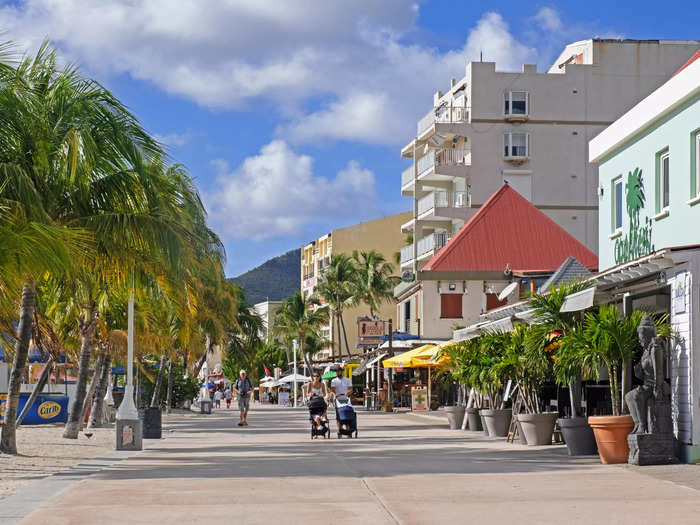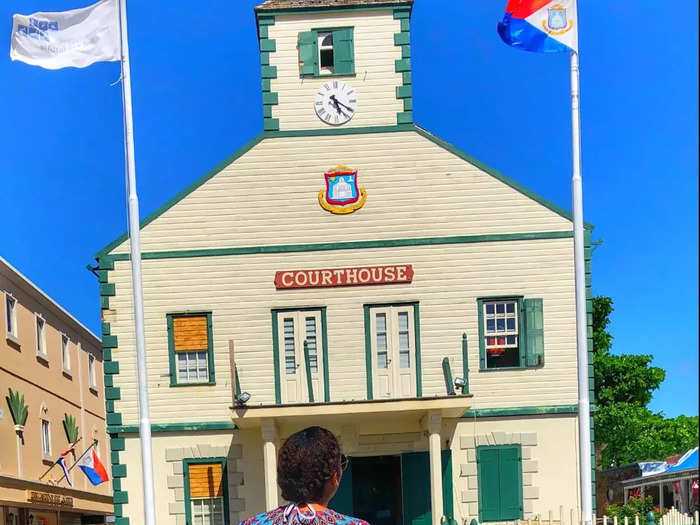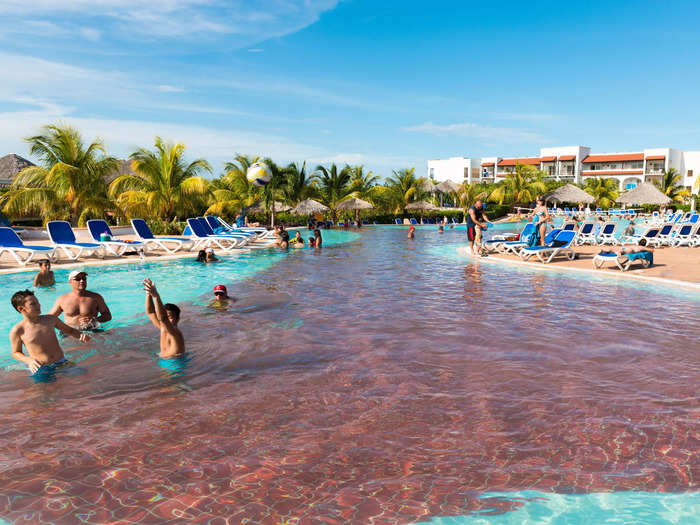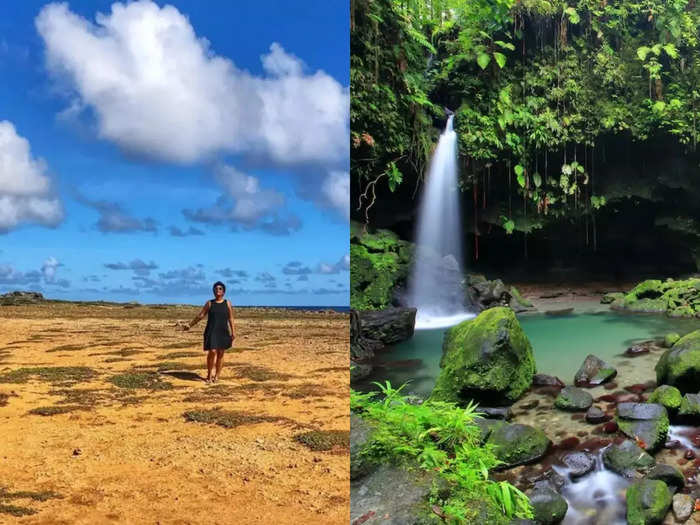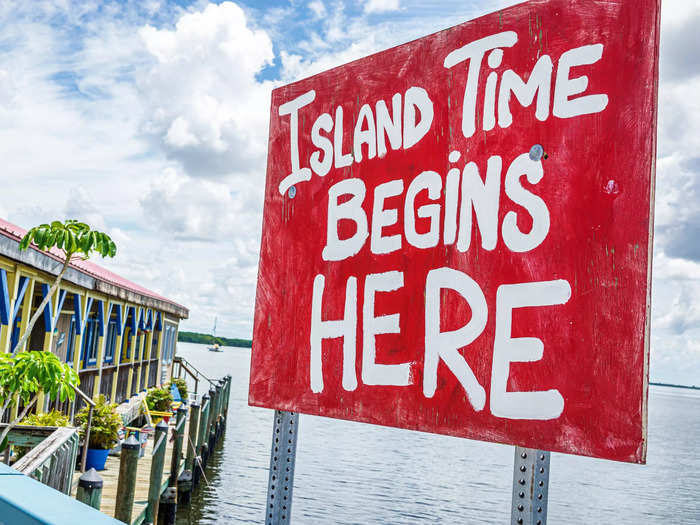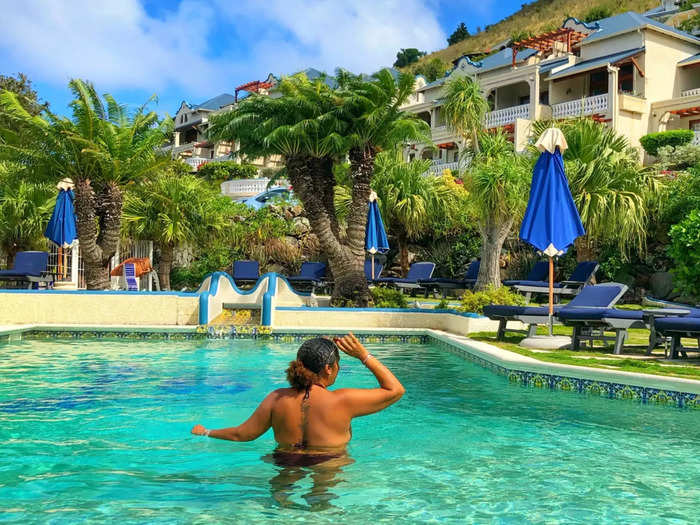Riselle Celestina, a travel writer and consultant.The Traveling Island Girl
- Riselle Celestina is a Caribbean native and travel writer who helps visitors plan trips to the region.
- She lives in St. Maarten and has visited both popular and lesser-known Caribbean islands.
Riselle Celestina lights up whenever she has the chance to talk about the Caribbean.
Born on the island of Curaçao, Celestina has called St. Maarten home for more than two decades.
Between the region's welcoming people, diverse landscapes, historic sites, hidden destinations, and rich cultures, Celestina told Insider that she's seen and experienced many of the islands that make up the Caribbean.
She isn't afraid to share the highlights of her home on her travel blog The Traveling Island Girl or her podcast Paradise Perspectives. And while she's eager to broadcast the good, she doesn't hesitate to share the ugly, too.
Celestina told Insider that her points of frustration often stem from visitors and their behaviors. Whether it's a cruise passenger who prances around St. Maarten wearing only a skimpy swimsuit or a visitor who forgets to say hello, Celestina said there are plenty of things tourists do that annoy both her and other islanders.
Before a trip to the Caribbean, Celestina urges travelers to research. And once you're there, don't be afraid to keep learning.
"It's your vacation destination, but it's our home," she said.
Celestina's biggest annoyance is when tourists don't greet her or say hello.
Tourists walking on a boulevard in the capital of the Dutch island part of St. Maarten in the Caribbean. Marica van der Meer/Arterra/Universal Images Group via Getty Images
Celestina wears many hats. Beyond her travel blog, podcast, and travel consulting business, Celestina owns a bar on St. Maarten.
She said tourists often walk into her business and place an order without ever saying hello.
And this doesn't just happen inside the bar. She said she's had plenty of instances where tourists flag her or another local down to ask a question. Instead of greeting her or the other locals first, they immediately ask their questions.
Celestina said she finds this rude. It's common courtesy to start a conversation by saying good morning or asking how someone's day is going in the Caribbean. Even a simple hello will suffice, she said.
"This is super important to us," she said. Not only does this create a friendly atmosphere, but it also opens up a dialogue so everyone can learn about one another.
Celestina said she also gets frustrated by tourists walking around an island in only their bathing suits.
Riselle Celestina wears a dress outside St. Maarten's courthouse. The Traveling Island Girl
Celestina said she can always tell a local from a tourist because tourists are often wandering around her home island in bathing suits and nothing else.
To Celestina and other locals, that's unacceptable, she said. Most Caribbean people and Caribbean business owners appreciate it when tourists are covered up while walking around town or shopping.
"What you need to remember is that at the end of the day, it's still a functioning society," she said. "You need to respect it."
For example, in St. Maarten, tourist shops are next to government offices and other important offices. Celestina said it's not appropriate for tourists to be walking around wearing bathing suits when professionals are walking around in their business attire.
Celestina said she's noticed the problem increasing in recent years, and added that more and more businesses have started posting signs telling tourists they need to be clothed when they enter their shops.
Celestina acknowledged that visitors might not realize it at first.
"Everybody's really pushing the beach scene, and we're pushing the shopping on the front street, which is parallel to the beach. I can totally understand that," she said. "We have lost our way of actually communicating to the visitors that it's actually not exactly nice for you to be walking half naked in the street."
Visitors who never leave their all-inclusive resort aren't really experiencing the island they're visiting, she said.
Tourists at the Memories Paraiso Azul in Cuba. Machado Noa/LightRocket via Getty Images
All-inclusive resorts are located across many of the Caribbean's most popular islands.
"My pet peeve is people that only stay in all-inclusive resorts," Celestina said. "All-inclusive resorts are not good for the island."
St. Maarten, for example, has a handful of all-inclusive resorts across its island that are owned by major corporations.
When a tourist stays at an all-inclusive, less money goes into locals' hands, Celestina explained.
"I think I can speak for St. Maarten," she said. "Most of the money doesn't stay on the island. The whole point of an all-inclusive is to keep the visitors in that resort at all times."
Beyond an economic perspective, Celestina said that visitors who stay at all-inclusives don't get a real taste of the island they're visiting.
That's because the tourists are often dining at on-site restaurants, tanning at on-site beaches, and rarely leaving the property, she said.
"You haven't experienced the people of the island, you haven't experienced the atmosphere, the vibrancy, all of that. It's just that it's kind of lost," she said.
Celestina said she hates it when tourists think every Caribbean island is the same.
Side-by-side images of the islands of Curaçao and Dominica. The Traveling Island Girl/Shutterstock/emperorcosar
The Caribbean has a reputation for its white sandy beaches, crystal-clear oceans, and palm trees, Celestina said.
While plenty of the region's islands have that, they have so much more to offer, she said, adding that it's annoying when visitors arrive and only soak in the sun on a sandy shore.
Plus, Celestina said she gets even more annoyed when visitors go to one island and think they've seen all the Caribbean has to offer.
"There's such a big variety when it comes to the different Caribbean islands," she said. For example, the island of Saba doesn't have any of the stereotypical beaches tourists expect and Aibonito is filled with waterfalls and rainforests.
Celestina said potential visitors are always asking her if they should plan a trip to Aruba or St. Marteen. But she thinks this is a ridiculous question.
"They're just so different," she said. "I need to know what you're looking for to get out of your vacation."
Her advice is to figure out what type of vacation you want. Do you want to dine on a variety of cuisines? Lie in the sun all day? Go diving or explore rainforests?
From there, you can start researching and asking which of the hundreds of islands might be the right fit for your trip.
Celestina is shocked by the stereotypes tourists joke about when they visit.
An "island time begins here" sign. Jeffrey Greenberg/Education Images/Universal Images Group via Getty Images
Celestina said TV and Hollywood have created a handful of negative stereotypes when it comes to the Caribbean. The two immediate ones that pop up for Celestina are the concept of island time and accents.
Celestina said she hates it when tourists expect her and other native Caribbeans to be late.
"I strive to be exactly on time, every time," she said.
"We talk about island time in a very negative 'ha-ha' way. That's how it's perceived in television," she added. "But no, that's not who we are."
Along similar lines, Celestina said she's no longer shocked when tourists put on a Jamaican Rastafari accent when they speak to her.
"We don't talk like that, and I'm not in Jamaica," she said. "That is such Jamaican slang, and people don't understand there are so many different languages and different connotations and different accents across the Caribbean."
Celestina wants tourists to remember that when they're visiting, they're the ones with the accents and that it's rude to mimic another culture.
"When you sit there and you make fun of somebody's accent, what you're doing is you're actually demeaning the accent," she said.
Finally, Celestina said tourists shouldn't assume all Caribbean natives are in the hospitality industry and there to serve tourists.
Riselle Celestina at a hotel in St. Martin. The Traveling Island Girl
Celestina urged travelers to remember that not every Caribbean local is Black, not every visitor is white, and not every local is there to serve tourists.
Celestina said plenty of promotional videos have showcased just that: "It's always white people being portrayed as the visitors. And whenever you portray someone from the Caribbean in those promotional videos, it's always someone in the hospitality industry assisting or helping the white person."
"That is something I think we need to start changing," she said.
Celestina said these promotional videos and stereotypes about race trickle into her daily life as a Black business owner. Plenty of times, she said, tourists doubt that she's the owner because of her race.
"Their mouth drops to the floor when they learn I'm the owner," she said. "People assume that we are all in hospitality helping the visitor and not in a position of power or in a managerial position or owning a local business. That is always aggravating."

